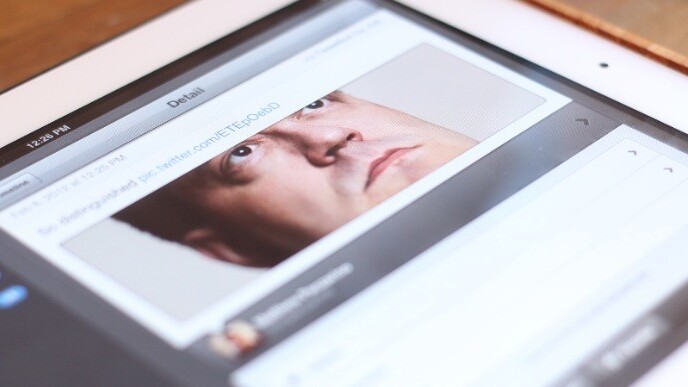
With the release of Tweetbot for iPad earlier today, we thought that this would be a good time to kick off an ongoing series of interviews with developers, designers and product managers actively working in the Mac and iOS field. This week, we speak to Tapbots’ Paul Haddad about the state of the App Store, developing for other platforms and why he hates the term ‘heavy’.
Paul is a web and software developer who has been developing for the mac platform for over 15 years. He also developed and maintains a popular pasteboard manager, PTHPasteboard Pro. He likes to avoid any sort of exercise, household duties, and hates writing bios about himself. Paul lives in Flower Mound, TX with his wife, 3 kids and 2 dogs.
The Next Web: So, how is it that you started developing for the Mac? I’d assume it was a natural lead in to iPhone development, but how did you begin?
Paul Haddad: I actually am a NeXT guy, been one since college. Love it at first sight and had to have one. Soon after I got one I started coding and kept with it and the various twists and turns ever since. So I never did OS 9 stuff, maybe Mac guy isn’t the best way to put it but it’s what everyone knows. A pretty natural lead in, If you know one its relatively easy to know the other.
TNW: So was developing for the iPhone something you knew you wanted to get into immediately as the App Store launched?
PH: I actually didn’t get into it until around 6 months after the App Store was launched. I was way too cheap to actually buy one of the devices new so I waited and only started after Mark [Jardine, Haddad’s partner and the designer of Tweetbot] sold me his old iPhone.
TNW: Haha, that’s one way to get into it. And you and Mark had known each other for a while before this? Worked together?
PH: We were both working for the Oakley web group at the time. We were working on a project together and I decided I wanted to try to do an iPhone app. I can’t design a straight line so I asked him for help and that’s where Weightbot was born.
TNW: So the aesthetic, and the ‘robot’ theme is Mark’s doing then? Or do you have a robotic obsession as well?
PH: That’s pretty much all his idea, the look, how things work and feel, that’s almost always his ideas. I’ll throw out some ideas once in a while, he’ll laugh at most and agree with a few.
TNW: That’s good. It’s nice to have a complimentary working relationship.
PH: And sometimes I’ll say nope that’s too damned hard or impossibru. But yeah we both have our areas and pretty much stick to it. I can’t draw or design, he can’t code. We’re both fine with that. But enough about the past, can we talk about Rampart?
TNW: I know I’m not alone when I feel that Tweetbot seems to be a full toolbox of functionality. Was it a concious decision on both of your parts to make it a feature packed client or did it start out more minimal and work its way up to being more complex?
PH: It was definitely conscious, our main competitor at the time (and really still now) was Tweetie. We knew we couldn’t release an app that didn’t have at least the vast majority of the same features.
TNW: I know one of the major complaints about TweetBot has been its “heavyness” in terms of design and animation. It also seems to bug some designers and developers to no end that it doesn’t use ‘standard’ transitions and animations. Was that also conscious? To make it feel and work differently? Or was it just a function of trying to fit in all of the things that you wanted it to do?
PH: So I hate the term heavy, just bugs me to no end because its a nonsense term to me. But yeah it was conscious a way to make it look and feel like our other apps. I think we actually do use pretty standard animations and transitions in 1.x. We’ve actually done a lot more crazy transitions in our other apps than in Tweetbot. In Tweetbot 2.0 Mark made some of the colors a little more subtle which hopefully will do away with that “heavy” feeling. But it’s just never going to be the standard white cells with black text that a lot of iOS apps use. We want it to have personality.
TNW: I’m not fond of the term heavy either, I don’t think that half of the people who use it understand what it means. Perhaps ‘more fiddly’ is really what they mean. there are more moving parts in the typical Tapbots app than other apps.
PH: I never loved Tweetie, it was a great app and Loren [Brichter, the developer of the original Tweetie app] did a lot of things really well but it always seemed a bit boring. I like Twitterific better at the time because it just wasn’t your typical iOS looking boring app.
TNW: Now, I follow you on Twitter so I know that you’ve been hounded every day since Tweetbot came out about when the iPad version would be released. So I’ll ask you the same dumb question they’ve been asking you ‘what took so long?’
PH: Two reasons. At the time we released Tweetbot for iPhone the Twitter landscape was in a bit of an upheaval. Twitter seemed to be sending messages that they didn’t want anyone else in the client arena and we listened to them. We got a lot of requests but it didn’t seem like it was worth risking things. Sometime after summer of last year things started to change. Twitter started clarifying its message and it just started to become clear that they weren’t going to just shut down other clients.
The second reason is we’re slow, I guess I should probably say methodical but really we’re just slow. We started working on this 6 months ago and just finished up a week ago.
TNW: Sounds reasonable to me. Tweetbot iPad feels like a very good translation of the iPhone version, which is the best thing that you can hope for I suppose, when an app is as well received as it has been so far. In fact, it seems to me that the feature-rich nature of Tweetbot seems to live a little easier with more room to breathe, if that makes any sense.
PH: Yeah we definitely wanted to make the iPad version familiar to all the users of the iPhone version, while still adding extra bits where the screen room allowed for it. We also tried hard not to overwhelm the user with a ton of detail all shoved into one screen. Twitter for iPad has a really innovative UI that some people really love, but I find that it can be quite overwhelming at times with so much showing.
TNW: Absolutely. One thing that Tweetbot for iPad does really well, I’ve found, is that it provides you with an immense amount of information without having to load data live. The timeline holds a ton of tweets and DM history is expansive. All while remaining very stable so far. Is this a result of pushing the Twitter API harder than other apps, even Twitter’s own, which loads and retains much less history?
PH: It’s a fine line with how much data you can load or save versus how much memory the iPhone or iPad has and also how much you can grab out of the Twitter API. It’s something I’m continuously tweaking and I have some long-term plans to try to keep more of that data around since I’m still not all that crazy how little we save in some areas.
TNW: You mentioned that Twitter has become more communicative with developers of third-party apps. For a while there the ecosystem had a very cold-war vibe. I know you’re probably not interested in stirring up trouble, but are you more comfortable with how things are going on that front now?
PH: I’ve been saying and Tweeting for a while now that things have gotten better on the client front. Specially with Twitter 4.0 coming out its pretty clear that they are focusing on new users and non power users. We can come in and provide a different experience more tailored to people who really use the hell out of Twitter. It’s really a win-win situation for us, they get more users by making their app simpler and we get the users who need more features and outgrow their clients.
TNW: Even before the new app it was obvious that this was the way they were headed, and that [CEO] Dick Costolo was probably the best guy to help them make that jump.
TNW: Are you guys happy with the state of the App Store today? I know that lack of discovery options makes it hard for apps to gain traction, though you have had some success obviously. Is there anything that worries you enough to want to, say, diversify to Android or Windows Phone?
PH: We aren’t really looking to go anywhere else. There are lots of things that we’d love to see Apple change but nothing is a deal breaker. As far as Android I hate Java and we both dislike the way it looks. Windows Phone though I don’t have any problems with it other than just being a tiny platform now. With just the two of us, even if we wanted to add another platform we just don’t have the time.
TNW: Great, so Tweetbot for Windows Phone, coming in Fall 2012, got it.
PH: Sure if Microsoft wants to send a ton of cash our way.
TNW: What do you think that the next big trend in apps is? More connectivity? More gesture-based navigation as another generation of users who have grown up with multitouch comes of age? Rageface-based navigation?
PH: I’m a big fan of gestures, that along with clever animations can really make interfaces lots of fun. But if I knew for sure I would be sitting here coding it now instead of telling everyone about it.
TNW: Fair enough
TNW: From someone at a relatively design-forward studio that makes well-recieved and well-made apps, even if they aren’t for everyone, what do you think is wrong with Google that it can’t seem to produce a mobile app for iOS that looks decent or works as advertised?
PH: I think the biggest problem is that Google chooses to develop iOS apps using web technologies. This might work well on Android but it just makes for a crappy feel on iOS. If you want people to use and love your apps on iOS they should be tailored for iOS and should feel like an iOS app. You can’t just hack together some cross-platform Javascript and HTML and expect it not to feel like something that was hacked together.
On top of this they are an engineering focused company without a great history of design. This works really well on the Web where you just want to go in, search for some results and get out. But on an iPhone the interaction is much more intimate, people want something that looks and feels just right, the front end is more important than the back end.
TNW: On the other side of the coin it seems that Microsoft has a platform that is getting a lot of respect from design and development savvy people. I personally think that it’s pretty great myself. But it can’t attract developers. The chicken-or-egg conundrum. How does a company like Microsoft convince independent developers making great apps that Windows Phone has a future?
PH: Microsoft has done a really good job creating a unique looking platform that actually looks pretty good. Marketing wise they’ve just made a mess of things. Whose idea was it to make a reasonable headset like the Lumia 800 and then sell it with a useless bundle for $900? They need to get rid of those people.
Microsoft is really facing a big problem right now with a lack of high quality apps. They aren’t going to get those apps without a much larger customer base, and they aren’t going to get that customer base without having a lot of good, exclusive apps. The solution to me has always been relatively simple, they need to go out and bribe developers to leave iOS and write for their platform instead. Take a billion dollars and just spread it around and try to buy out some of the developers. Maybe a little unorthodox but just sitting on their collective asses waiting for people to come to them isn’t going to work.
TNW: I would love to have some of my favorite iOS developers making apps for Windows Phone. It’s one of the only big issues I had with the Lumia when I tested it out.
PH: I’m sure with all those get rich quick stories coming out of Windows Phone land they’ll get right on it, oh wait.
TNW: Ernest Hemingway wrote one of my favorite things about writing, which was that in order to break open a story that was eluding you, all you had to do was “write one true sentence. Write the truest sentence that you know.” If you could impress one bit of truth on someone who is working on trying to crack a development problem, what would it be?
PH: Software all boils down to ones and zeroes and a bunch of simple operations, everything is possible, not everything is practical. I always try to keep that in mind and it’s served me well.
We hope you enjoyed this interview, please stay tuned for more in this series as we have some interesting folks lined up. Not that Paul isn’t interesting. He knows my email address, I’ll probably hear about this.
Get the TNW newsletter
Get the most important tech news in your inbox each week.




